- Home
- Micheal Maxwell
Helix of Cole Page 11
Helix of Cole Read online
Page 11
The words on the page seemed like they were written by someone else. The style, the voice, even the tone of the article seemed so foreign to Cole. The arrogance, he thought as he went over the article again. “Their willingness to base a revolution on the lyrics of rock songs only underlines the utter futility of what they set out to do.” Cole would have chuckled at his own words if the voice of the man on the phone hadn’t interrupted his thoughts: “Theirs was a new vision and a new day. That vision is now reborn in me.”
Cole glanced around the stadium. People were making their way back to their seats, arms full of cushions and beer, hot dogs and sunscreen, happily unaware of the evil that robbed Cole of his escape into the national pastime.
Cole missed Wrigley Field. He’d spent many an afternoon hiding from work in the bleachers. The Cubs were the perfect team for Cole’s level of enthusiasm for the sport. Since he didn’t care if they won or lost, it made his addiction to people-watching far easier than if he was a big baseball fan cheering for his team to win. He loved Chicago fans; they never failed to provide a more entertaining show than was on the field.
Today he needed the crowd, the noise, and the sunshine to distract him from the fear of what would happen if the bomber kept his promise. Harris told Cole if he’d pay for parking, he had a big surprise for him. The surprise was seats in the Club Box section just across from first base.
“Just out of curiosity, where did these come from?” Cole asked, holding up his ticket stub as Harris returned to his seat.
“Graft.”
“These must cost $80!”
“$88. I don’t come cheap.” Harris grinned. “We caught a guy who burglarized a pawn shop, and we retrieved about 80% of what was stolen. The owner has season tickets and every couple weeks, there’s an envelope in my box at the station with a couple in it. I told him I couldn’t take them, but he always says he doesn’t know what I’m talking about.”
“So, here we are!”
“So, here we are,” Harris said, raising his Polish dog in a salute to home plate.
The afternoon was glorious. There were just enough clouds and enough of a breeze to take the edge off the heat and keep it cool. Cole saw several old friends, ate two Polish dogs and a bag of popcorn. Between games, Harris went for a walk and Cole dozed off. If you held a gun to his head, Cole couldn’t have told you the score of the game, but he enjoyed just being at the ballpark.
Harris spent the day bringing Cole up to date on his family, the details of several oddball cases, and the strange twists on a few still unsolved. He ate four hot dogs, three beers, and a batter’s helmet full of soft-serve frozen yogurt. It was like playing hooky from school, and both men thoroughly enjoyed the escape. And for a few hours, they tried to forget bomb threats and the crimes of the city.
The second game was a nail biter. The Cubs were up by a run and then down by two. Inning after inning, the teams switched positions on the field as well as the lead. Bottom of the ninth, St. Louis tied up the score, and the game went into extra innings. Even the faithful were starting to go home. Cole’s backside was starting to tire of the hard plastic seats, and he hinted to Harris that the hour was getting late, but his words fell on deaf ears as Harris continued to yell encouragement and reproach to his beloved Cubs.
The trickle of fans leaving became an exodus by the bottom of the tenth. Harris finally gave in and agreed to call it quits. In the crowd, Sergio DiVencinci and his grandson Carlo gathered their things and were making their way toward the gate. Sergio felt the absence of his wallet and told Carlo to stay at the gate while he went back to check their seats. Carlo stood watching the crowd laugh, argue, and make their way out of bleachers on the corner of Waveland and Sheffield. He enjoyed the radiating warmth of the brick wall just around the corner from the gates as the setting sun gave way to the cool evening breeze. The wait seemed to be taking forever for the 11-year-old. He remembered the pouch of Big League Chew bubble gum in his pocket, although he’d forgotten how much he chewed during the long day at the park.
As he dug for the remaining gum, the pouch slipped from his fingers, and the breeze blew it along the wall. He heard from his grandfather on more than one occasion that Wrigley Field was a shrine to baseball and that everyone must keep it clean, so Carlo followed the tumbling pouch as it rolled and finally came to rest against a green canvas backpack.
There was no one near the backpack. Carlo picked up the empty gum pouch and started back toward the gates. He looked over his shoulder at the backpack. Still there, he thought. The boy stopped just in front of the gates. No grandfather. Carlo walked back and looked again down the wall. The backpack was still in the same spot. The boy’s curiosity was more than he could stand. He walked to where the abandoned backpack set.
His father found a tennis bag at the park once. There was a University of Illinois sweatshirt, two cans of balls and $23 inside. Carlo remembered his father telling him that since there was no identification on the bag, it was “finder’s keepers, loser’s weepers.” A kind of a gift from heaven, his father said. Could this be a gift for Carlo? Papo will know, he thought. He gently kicked the bottom of the bag. It was heavy. He bent down, flipped over the strap. No tag. He took one of the straps tightly in hand and turned the bag so he could see the side that was against the wall. Nothing behind the plastic ID window, either.
He would take it with him. If anyone came looking while he was waiting, he would take the backpack to them. This would be the right thing to do. Carlo paced proudly in front of the gate with his new backpack over his shoulder. As he walked, he felt just like one of the high school boys that caught the bus at the end of his street. From inside the stadium, he heard a great cheer go up. The Cubbies must have won! They left too early.
Grandfather has been gone a long time, the boy thought. Then suddenly there he was, coming through the crowd, waving. In his hand was his wallet, and on his face was a smile of relief. Carlo waved and nearly jumped up and down with excitement.
“Papo! Papo! Look what I found!” Carlo shouted.
The grandfather stopped and patted the boy’s shoulder. “What is it?”
“I found this!” The boy thrust out the backpack. “Dad says if there is no ID, you can keep it! Can I keep it? I don’t see any ID.”
“Let’s take a look, Carlito.”
The crowd was bumping the old man, so he stepped closer to his grandson. He took the straps and draped his arms through them, reaching to pull the zipper back to check for identification.
The force of the explosion was felt more than heard inside the stadium. Nails ripped through the little boy’s neck, nearly decapitating him. The old man took the full force of the explosion. Nails went through his stomach, out his back, and embedded in a woman behind him. Nails sprayed out in a chrysanthemum of death. Nails pierced faces, necks, and shoulders to the left of Grandfather and Carlo. Nails cut a swath through the necks, backs, and legs of the people to their right. Blood and tissue sprayed several yards all around the explosion. The force cleared a 20-foot circle in the crowd.
The panic was as explosive as the bomb, and people ran in hysterical terror. Others just stood, staring, unable to take in the carnage before them. One member of the security staff and a Chicago police officer were killed instantly. A second man in a yellow security jacket stood with a stunned look on his face, a nail driven deep in his cheek. A Chicago police officer standing by his patrol car had the presence of mind to radio stadium security, and they began diverting the crowd away from the gate.
Tom Harris heard the explosion moments before his pager started buzzing and his cell phone rang. The voice on his cell was excited, coming in bursts.
“Harris! Where are you? Did you go to the game?” The voice was Patrick O’Malley, chief dispatch officer.
“Yeah. What’s goin’ on, O’Malley?”
“A bomb. At the bleacher gate on Sheffield. Bodies everywhere. Oh, Jesus, lotta people down. The 911 calls sound like they’re coming from a scene out
of Dante’s Inferno. How close are you?”
“A ways. I’ll head that way.”
“I got nothin’ but rookies and reserves out today. The big doin’s at Daley Center has drained us. Get over to the gate quick, can ya? I’ll send everybody I can. Fire and rescue are on their way. Call the chief when you see what’s what. You’re the only experienced man I got within five miles.”
“On my way, Pat.”
“God bless you, Tommy. This ain’t gonna be easy.”
Cole gave Harris an inquisitive look. Just as Harris started to respond, the voice of Paul Friedman came over the public address system. There was no excitement or emotion in his voice. It sounded very strange for the man who called the plays, introduced the players, and welcomed VIPs to Wrigley Field to ask for calm.
“Ladies and gentleman, I need your help,” Friedman began. “Please take your time leaving the stadium today. We have an emergency at Bleacher Gate N. You are in no danger. If you’re in no rush to get home, be seated and let the crowd thin out. There’s no congestion if you use Gates K and F. Everything is under control. There’s no need to rush. Please be kind to each other. Move to the exits, and drive home safely.”
“That guy’s got ice water in his veins,” Harris said, looking towards the announcer’s booth.
“A bomb.” Cole’s words came out choked and dry. “Just like he said.”
Harris leaned in close to Cole’s ear. “Yeah, it’s bad,” Harris said flatly. “Lot of injuries. I need to get over there.”
Cole followed Harris as he tried to make his way against the flow of people headed out. The crowd was calm, but signs of worry were everywhere. Parents pulled kids close. Cole caught bits of conversations as they passed people. Words like bomb, explosion, and terrorist came in the snippets as they struggled and pressed their way through the crowd. Harris cut across seats and jumped rails. He moved faster and faster as the crowd thinned in front of him.
A mass of wet newspaper where someone spilt a beer caused Cole to slip and land hard on his knees. His palm was scraped where he caught his fall on the cement step. Harris kept moving, and Cole limped behind from the pain as he tried to keep up.
“This way.” Harris pointed to the Gate N sign.
The tunnel under the stands was dark and seemed to have a lot of debris. Blankets, hats, jackets, and programs were on the ground everywhere. The light of the exit loomed larger. Harris stopped. At the gate was a pile of eight or nine bodies. The twisted forms lay atop each other as if they’d all just lain down. Cole moved past Harris, and closer to the bodies. Moans and crying were coming from outside the gate. The bodies in front of him were still.
“This way, Tom,” Cole said. There was a gap between the wall and the bodies. Cole slipped past them, out the gate and into the light.
The scene in front of them was panic and carnage. The area was red with blood. The sidewalk looked like it was painted, and the walls on either side of the gates were splashed with blood and tissue. At his feet, Cole saw an arm lying at an odd angle, still clutching a horn. It was blown away from its body. A few feet in front of him was a pair of legs sticking from a blue denim skirt, but there was nothing from the belt up. Cole turned his head and saw that the wall was sprayed with something sticking out from the brick. He moved closer and saw that nails were driven into the brick at strange angles, some with bits of cloth and flesh attached to them.
The sound of sirens screamed through the air. An ambulance pulled up on the sidewalk, and paramedics stood motionless as their eyes surveyed the bloody nightmare before them. Cole turned to locate Harris. He was approaching a young officer who stood next to a woman with a young boy in her arms, rocking back and forth. The child’s face was partially blown away, and in his forehead were two nails, sticking out at opposing angles. His mother rocked and wept, her mind unable to comprehend the severity of his wounds.
“Carter!” Harris yelled at the young officer. Harris looked again at the officer’s brass nameplate just to be sure. “Carter, damn it, snap to!”
The young man looked up at Harris with a blank stare and didn’t change expressions.
“You’re a Chicago police officer. Start acting like it! Get these people back and clear the way for the fire and ambulances!” Harris made broad strokes with his arm, indicating the people who stopped in the street in shock and horror of what they survived. Carter turned and slowly started walking toward the crowd.
“Move!” Harris yelled.
He hit several buttons on his cell phone, turning and pacing as he began speaking. His right palm flat against his forehead, he spoke into the phone. “Chief, Tom Harris. I’m at the scene. God, I don’t know. Fifty, 100, it’s hard to say. Maybe more, yes, more. Fire is just arriving. I have two officers and a couple of reserves I can see from here. We need a lot of backup, a lot of emergency. It was loaded with nails, sir, hundreds of nails. Yes sir, I think so. No sir, I will.” Harris snapped the cell phone closed and dropped it in his pocket.
“What can I do?” Cole said as he approached Harris.
“Kick those paramedics in the ass and get them busy. I have no idea how they start, but anything is better than staring. Would you look at that!” Anger flared in Harris as he pointed at the pair still standing at the ambulance.
“He did it,” Cole said flatly.
“Don’t start, Cole. I got enough to worry about without you freakin’ out on me.”
“I’m okay. I just can’t believe he really did it.”
“See if you can help somebody. Forget who did it for now. That will come. These people need help.”
Cole jogged over to the paramedics. “Okay, guys, this is what you’ve trained for. Focus on the survivors. Let’s get busy.” Cole walked to the back of the ambulance and opened the doors. “Come on! What do you need out of here?”
As he called for the ambulance crew, a fire truck pulled up and six firefighters jumped off. As they hit the sidewalk, one of the six began retching violently.
“Oh, sweet mother of God, what happened here?” a short curly haired firefighter cried.
“Jimmy, what the hell you want us to do?” another called out.
“Fan out, see who’s alive and who’s dead,” a tall, thin man responded. “Just use your gut. Do what it tells you.”
Within moments, a white Chicago Fire SUV pulled up along with three more fire trucks. In the next several minutes, a total of nine ambulances arrived. The police pushed the crowd back four blocks and set up a parameter around the south end of Wrigley Field.
The last to arrive was the FBI. They took control of the scene, and technicians began to reconstruct the explosion, gather materials, and interview survivors. The emergency personnel on site were instructed by the FBI on what to touch and what to leave alone. Once the injured were removed, the carnage was photographed and a grid laid out for identification of every piece of evidence. This process went on until the early hours of the morning when, under the guidance of the FBI, a team from Cook County Coroner’s office arrived and began bagging and tagging the bodies. Eight men in biohazard suits began to collect and process limbs, partial bodies, and two heads that were found against the wall.
Around midnight, Cole and Harris crossed Sheffield and went to Murphy’s Bleachers, a sport’s bar across from the gate. The manager had set up a sandwich table with coffee and sodas for all the emergency workers. Cole found a booth with a wall that blocked the view across the street and sat down. A minute later, Harris slid into the booth with a cup of coffee.
“You want anything?”
“Naw.”
“I called home and told Marianne that you’d spend the night. We’re just in the way now. We’ll let the Feds do their job.”
“How many? Did they get a count?” Cole looked at the steam rising from Harris’s coffee.
“Twenty-one confirmed dead, another 11 critical. Of those, who knows how many will make it.”
“I never dreamed he’d do it.”
“I know you d
on’t want to hear this,” Harris paused, “but it might not be him. We’re assuming it is the caller. We have no proof, and he hasn’t taken credit for it.”
“Come on, Tom, are you kidding me?”
“I’m just saying, we have nothing from the caller but a threat. Yes, it seems obvious, but much stranger things have happened. He said he’d call back. Let’s see what happens.”
Cole sat and thought about the call. Did he provoke him into this? His mind ached from the overload of fatigue and guilt. As he rubbed his eyes, the images of bodies and wounds rolled past in his mind. The slaughter was like a video playing over and over in his head. Why would a person bring such pain to innocent people? Families out to see a ballgame. The Family Night Double Header turned into a night of terror. Damn him, Cole thought. Damn him for what he has stolen from the children. Cole thought of his granddaughter Jenny and the Giants’ games they’d gone to. He thought of children who would now be afraid to go to the ballpark. Cole got a deep lump in his throat as he thought of the grief of the parents who brought their child to the game only to die at the hands of this animal. Damn him.
But Cole cursed himself too, as the author of the article that was the catalyst for all this pain.
CHAPTER 7
Reed sat in the car and listened to the game on the radio just a few blocks away. He gambled on St. Louis folding in the 10th inning, and won. He walked the few short blocks to the ballpark, backpack over his shoulder and a spring in his step, acting like he hadn’t a care in the world. Reed learned long ago that the people who got caught were the ones who looked and acted guilty. He was on a mission, a quest in a battle he would win. He looked like a confident, happy man.
As he neared the gate, he shifted the backpack so it’d be barely visible to anyone he approached. His hands were in his pockets, and the lapel of his jacket hid the strap. A cop and a security guard at the gate were smoking and chatting. The cop in the patrol car was reading the paper, waiting to direct the crowds. Reed slipped the backpack off his shoulder, letting it gently drag on the ground, then opened his fingers and let it drop against the wall. He put his hands back in his pockets and crossed the street, circling back to where he parked the car. He got in, rolled down the window, and waited. Six minutes after getting in the car, he heard the explosion. He smiled, started the car, and drove back to the parking lot where he made the bombs. The Indians said nothing the previous night when he parked in their space at the end of the apartment building. They would say nothing tonight.

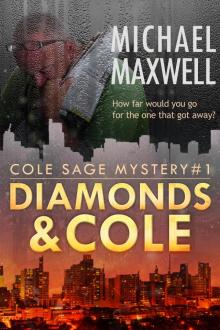 Diamonds and Cole: Cole Sage Mystery #1
Diamonds and Cole: Cole Sage Mystery #1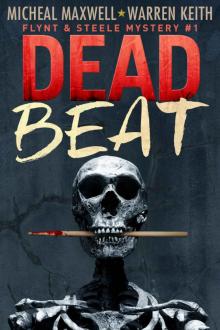 Dead Beat
Dead Beat![[Cole Sage 03.0] Helix of Cole Read online](http://i1.bookreadfree.com/28/cole_sage_03_0_helix_of_cole_preview.jpg) [Cole Sage 03.0] Helix of Cole
[Cole Sage 03.0] Helix of Cole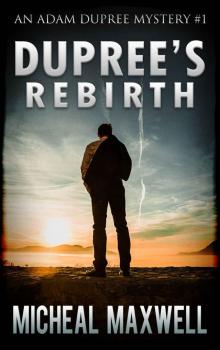 Dupree's Rebirth
Dupree's Rebirth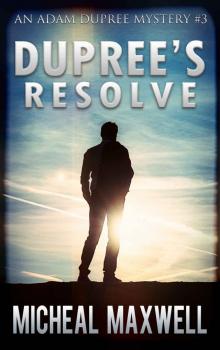 Dupree's Resolve
Dupree's Resolve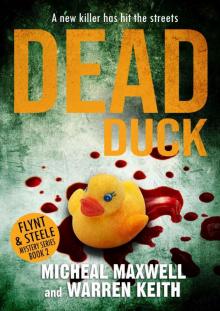 Dead Duck
Dead Duck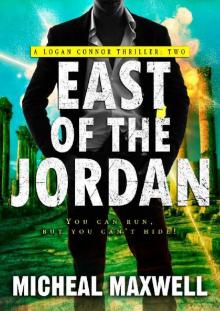 East of the Jordan (A Logan Connor Thriller Book 2)
East of the Jordan (A Logan Connor Thriller Book 2)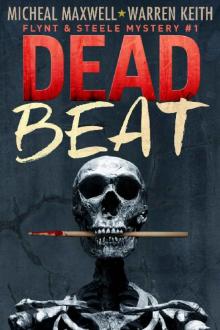 Dead Beat (Flynt and Steele Mystery Book 1)
Dead Beat (Flynt and Steele Mystery Book 1)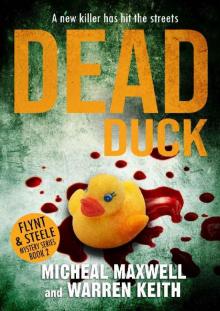 Dead Duck (Flynt & Steele Mysteries Book 2)
Dead Duck (Flynt & Steele Mysteries Book 2)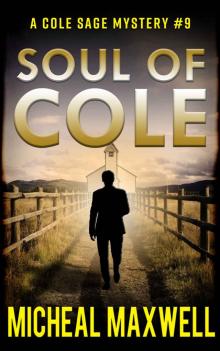 Soul of Cole
Soul of Cole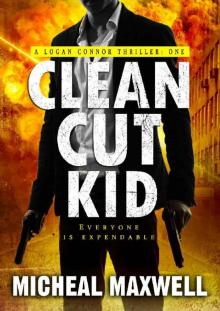 Clean Cut Kid (A Logan Connor Thriller Book 1)
Clean Cut Kid (A Logan Connor Thriller Book 1)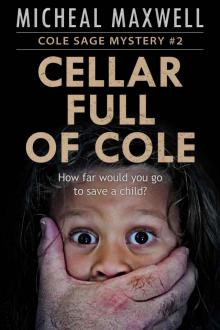 Cellar Full of Cole: A Cole Sage Mystery #2
Cellar Full of Cole: A Cole Sage Mystery #2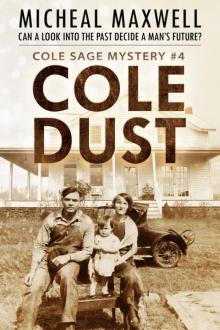 Cole Dust Cole
Cole Dust Cole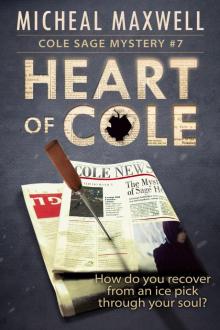 Heart of Cole
Heart of Cole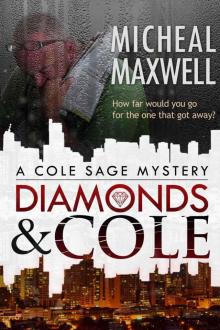 Diamonds and Cole: A Cole Sage Mystery
Diamonds and Cole: A Cole Sage Mystery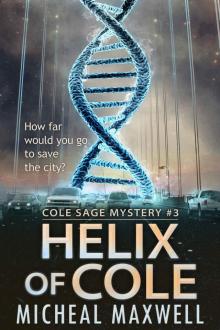 Helix of Cole
Helix of Cole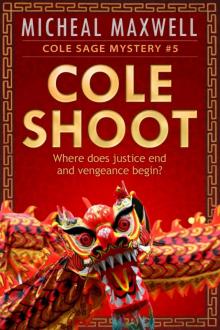 Cole Shoot
Cole Shoot